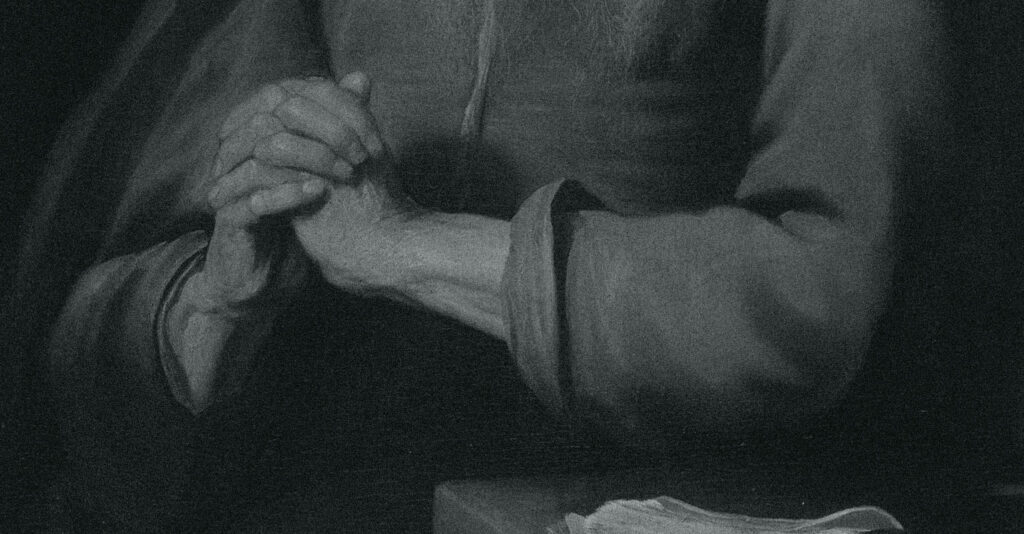
Mark 11
Therefore I tell you, whatever you ask in prayer, believe that you have received it, and it will be yours. (Mark 11:24)
We don’t always think of prayer as a doctrinal topic, but many of the best systematic theologies have a section on prayer, often as an aspect of God’s providential care. This makes sense. In an ultimate sense, God doesn’t need our prayers, but he has chosen to govern the world through secondary means, and one of those means is the prayer of his people. God has ordained prayer so that we may see our dependency upon him and so that he receives glory as the giver of all good gifts. Calvin devotes seventy pages in his Institutes to prayer. As a part of this exploration, he gives four rules for right prayer:
• First rule: reverence.
• Second rule: sincerity and penitence.
• Third rule: we give up confidence in ourselves and humbly plead for pardon.
• Fourth rule: we “pray by a sure hope that our prayer will be answered.”1
Drawing from texts like Mark 11:24 (“Therefore I tell you, whatever you ask . . . believe that you have received it, and it will be yours”) and James 1:5–6 (“If any of you lacks wisdom, let him ask God. . . . But let him ask in faith, with no doubting”), Calvin exhorts believers to be convinced that God is favorable and benevolent toward them. “It is amazing,” Calvin writes, “how much our lack of trust provokes God if we request of him a boon that we do not expect.”2
Of course, our prayers must be humble, and we should petition God according to his word (not according to all our whims and wants). But listen to godly Christians pray; they do not pray mealy-mouthed prayers. There are two great dangers in prayer: praying like we are God, and praying like there is no God. “Now what sort of prayer will this be?” Calvin asks in the same passage. “‘O Lord, I am in doubt whether thou willest to hear me, but because I am pressed by anxiety, I flee to thee, that, if I am worthy, thou mayest help me.’ This is not the way of all the saints whose prayers we read in Scripture.”
The most repeated command of Jesus, relative to prayer, is not how to pray or why to pray, but simply that we would pray. Ask, seek, and knock—that’s what Jesus wants (Matt. 7:7). He wants us to trust that God cares and be confident that God can help. That’s why prayerlessness is, at its core, unbelief. When Jesus comes again, will he find us praying and trusting (for the two are interconnected)? Or will he find us living and acting and planning and complaining and manipulating our own strategies as if there were no God at all?
Jesus knows that it is hard to keep praying and not give up (Luke 18:1). It is hard to pray for justice day after day and year after year with sometimes minuscule results. Prayer is first and foremost an act of faith—faith that there is a God, faith that he is a personal God, faith that we are able to come into his presence, faith that God moves the world through prayer, and faith that Christ intercedes for us at God’s right hand. We believe, Lord. Help our unbelief.
Notes:
- Calvin, John. Institutes of the Christian Religion, 2 vols. Translated by Ford Lewis Battles. Edited by John T. McNeil. Philadelphia: Westminster Press, 1960, 3.20.11.
- Calvin, John. Institutes of the Christian Religion, 2 vols. Translated by Ford Lewis Battles. Edited by John T. McNeil. Philadelphia: Westminster Press, 1960, 3.20.11
This article is adapted from Daily Doctrine: A One-Year Guide to Systematic Theology by Kevin DeYoung.
Kevin DeYoung is the senior pastor at Christ Covenant Church (PCA) in Matthews, North Carolina and associate professor of systematic theology at Reformed Theological Seminary.



